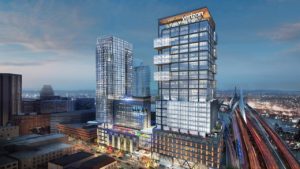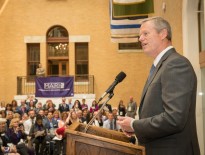Developer Boston Properties took what some considered to be a contrarian bet when it partnered with TD Garden owners Delaware North Cos. on a 1.9-million-square-foot development at North Station.
Bryan Koop, head of the firm’s Boston region, said the intent was to emulate the gritty neighborhoods in New York City such as the Meatpacking District that have become popular with tech and media companies. The North Station neighborhood had many of the same characteristics, but has been considered a less desirable market than the South Station submarket.
“If you talk to a real estate person, they all live in Weston and Wellesley,” said Koop, mentioning towns with commuter rail lines that tie into South Station. “That’s where they live and they’re all over 50. Where do the kids who write code live? They live in Somerville. They live near North Station and that got us fired up, because that’s the future economy.”
Speaking at Colliers International Boston’s annual market briefing held Thursday at the Boston Convention and Exhibition Center, Koop admitted he had sleepless nights after the firm kicked off the $854 million Hub on Causeway project, which also includes a boutique hotel, 440-unit apartment tower, supermarket and concert hall. But the tech tenant strategy paid off in July with a 440,000-square-foot lease by Verizon Communications in The Hub on Causeway office tower. Online security company Rapid7 leased the office podium building, in a relocation from 100 Summer St. near South Station.
The only setback, Koop said, is his longstanding attempt to rebrand the Bulfinch Triangle neighborhood near North Station as “Uptown” Boston.
“We made up a name for the neighborhood,” he said. “And everybody tells me it’s not sticking.”




 |
| 




